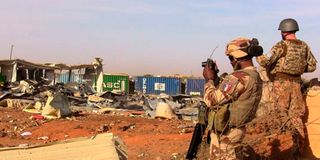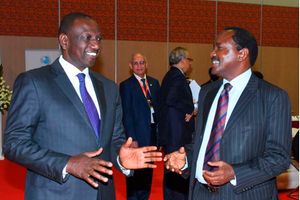Coups, kidnaps and jihadist attacks: A history of Niger

An aerial view of Niger's capital Niamey on February 18, 2021.
Niamey
Niger, a vast desert nation that straddles both the Sahara and the troubled semi-arid Sahel, goes to the polls on Sunday to elect a new president and legislature.
Here is a snapshot of its recent history.
Volatility
Niger gained independence from France on August 3, 1960. It saw the first of several coups in April 1974, before oscillating between military and democratic regimes until President Mahamadou Issoufou was elected in March 2011.
Issoufou is now standing down after two terms but backs his protégé, Mohamed Bazoum, in Sunday's election.
Growing attacks
In 2010 seven employees of the French nuclear giant Areva were kidnapped by Al-Qaeda in the Islamic Maghreb (Aqim) from a uranium mine in Arlit in the north of the country. The last four men were freed in 2013.
In May 2013 Niger was hit by two suicide attacks against a military camp in Agadez and an Areva uranium site, in which 20 were killed by jihadists loyal to notorious Algerian militant Mokhtar Belmokhtar.
In 2015 the Boko Haram jihadist group from neighbouring Nigeria carried out a spate of deadly attacks in the southeastern area of Diffa and against a military position on an island in Lake Chad, in which at least 74 were killed.
Since 2016 the southeast was also the scene of attacks by Islamic State in West Africa (Iswap), a dissident branch of Boko Haram.
On January 2 this year, 105 civilians were massacred by armed men in the villages of Tchoma-Bangou and Zaroumadareye in the western Tillaberi region in one of the worst such incidents in the Sahel.
Rival jailed
In late 2015 President Issoufou, who was seeking re-election, said a coup had been foiled with suspects being arrested. The opposition rubbished the claim.
In March 2016 Issoufou was reelected at polls boycotted by the opposition.
A year later in March 2017 opposition leader and former premier Hama Amadou was sentenced to a year in jail for baby smuggling, a charge he said was aimed at sidelining him. After returning from self-imposed exile in 2019, he was locked up before being freed this year in a coronavirus prison release.

Soldiers of the Barhkane operation on November 30, 2016s tand next to debris following a suicide car bomb attack by the Algerian jihadist group Mokhtar Belmokhtar at the airport of Gao.
G5 Sahel
In November 2017 the French-backed local anti-jihadist military force G5 Sahel was created for troubled regions of Mali, Burkina Faso Niger.
In late 2018 the Nigerian army deployed in the vast Tillaberi region near the border with Mali and Burkina Faso, which had become a hunting ground for jihadists, including the Islamic State in the Greater Sahara.
Jihadist attacks
Three attacks claimed by the so-called Islamic State killed 174 soldiers in late 2019 and early 2020. Army chiefs were fired.
Six young French aid workers were killed together with their Nigerien driver and guide on August 9 in the tourist hotspot of Koure, an attack also claimed by IS.
On December 12, 34 people were massacred in a Boko Haram attack in the southeastern region of Diffa on the eve of delayed municipal and regional elections.





